



 |
The North Pole—the ambition of many ambitious men in the decades before and after the first year of the Twentieth Century. In an age unsure whether wealth and comfort had made men unsuited to heroic deeds, each dreamed of accomplishing the one last heroic deed left to the physical explorer—to stand at the Pole; to awaken the polar goddess from her sleep of centuries; to grasp the white, Frozen Grail that had alluded all others. |
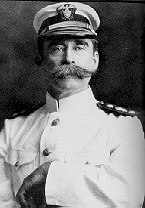 One of
those dreamers, Robert E. Peary,
a civil engineer in the US Navy, saw the conquest of the North Pole as
exactly that—one last chance in an increasingly mundane world for
timeless daring—something of a latter day knightly quest—one that,
coincidentally, he envisioned as leading to what he most desired—not
the North Pole, but temporal fame, and also immense wealth and eventual
immortality. After several false starts he decided that his route to
fame would be one to the top of the world, and that his name would be
known forever as that of the first man to reach it. When he had finally
settled upon his course, he told his fearful mother, "Remember Mother I
must have fame & cannot
reconcile myself to years of
commonplace drudgery and a name late in life when I see an opportunity
to gain it now and sip the delicious draught while yet I have youth and
strength and capacity to enjoy it to the utmost." One of
those dreamers, Robert E. Peary,
a civil engineer in the US Navy, saw the conquest of the North Pole as
exactly that—one last chance in an increasingly mundane world for
timeless daring—something of a latter day knightly quest—one that,
coincidentally, he envisioned as leading to what he most desired—not
the North Pole, but temporal fame, and also immense wealth and eventual
immortality. After several false starts he decided that his route to
fame would be one to the top of the world, and that his name would be
known forever as that of the first man to reach it. When he had finally
settled upon his course, he told his fearful mother, "Remember Mother I
must have fame & cannot
reconcile myself to years of
commonplace drudgery and a name late in life when I see an opportunity
to gain it now and sip the delicious draught while yet I have youth and
strength and capacity to enjoy it to the utmost." |
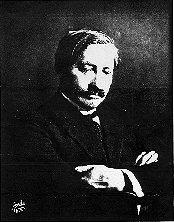 His
eventual rival, a physician from rural New York named Frederick
A. Cook,
had a different vision. He dreamed of the struggle across the chaotic
arctic ice toward the same goal as a divine test that would prove
himself to himself and also prove him the peer of all other men. "I saw
myself," he wrote of that vision, "attempting to win in the most
spectacular and difficult marathon for the testing of human strength,
courage and perseverance, of body and brain, which God has offered to
man, until I stood alone, a victor, upon the world's pinnacle." On
September 1, 1909, Frederick Cook cabled from the Shetland Islands that
he had stood the divine test and had reached the North Pole on April
21, 1908. The name of Frederick Albert Cook, who up to then had been
largely unknown outside of the exploring fraternity, was on the lips of
the entire world when word arrived on September 5 that Peary had
returned claiming victory in the same quest, but one year after the
date Cook had announced he had reached the Pole. His
eventual rival, a physician from rural New York named Frederick
A. Cook,
had a different vision. He dreamed of the struggle across the chaotic
arctic ice toward the same goal as a divine test that would prove
himself to himself and also prove him the peer of all other men. "I saw
myself," he wrote of that vision, "attempting to win in the most
spectacular and difficult marathon for the testing of human strength,
courage and perseverance, of body and brain, which God has offered to
man, until I stood alone, a victor, upon the world's pinnacle." On
September 1, 1909, Frederick Cook cabled from the Shetland Islands that
he had stood the divine test and had reached the North Pole on April
21, 1908. The name of Frederick Albert Cook, who up to then had been
largely unknown outside of the exploring fraternity, was on the lips of
the entire world when word arrived on September 5 that Peary had
returned claiming victory in the same quest, but one year after the
date Cook had announced he had reached the Pole. |
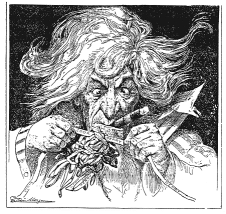 The
world was stunned that after centuries of failure and many gruesome
deaths, within a single week two explorers were claiming to have done
the deed. It was even more amazed when Peary bluntly denounced Cook's
prior claim as a fraud. Thus began the greatest geographical
controversy of all time, which quickly became a near obsession for many
as, day after day for four months, accusations mounted and arguments
raged over who was telling the truth. What came to be known as The
Polar Controversy,
was a dispute so bitter that it divided families and lifelong friends
into warring camps over one cold, yet burning question—a question that
continues to be argued over down to this very day, more than ninety
years after it was first asked: Who discovered the North Pole? The
world was stunned that after centuries of failure and many gruesome
deaths, within a single week two explorers were claiming to have done
the deed. It was even more amazed when Peary bluntly denounced Cook's
prior claim as a fraud. Thus began the greatest geographical
controversy of all time, which quickly became a near obsession for many
as, day after day for four months, accusations mounted and arguments
raged over who was telling the truth. What came to be known as The
Polar Controversy,
was a dispute so bitter that it divided families and lifelong friends
into warring camps over one cold, yet burning question—a question that
continues to be argued over down to this very day, more than ninety
years after it was first asked: Who discovered the North Pole? |
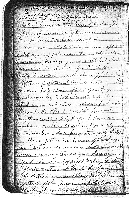 In
1989, the long hidden papers of Frederick Cook were given to the
Library of Congress. This development, combined with years of
fascination with the subject, sent the author on his own quest,
thousands of hours long, tens of thousands of miles traveled, hundreds
of thousands of pages read, and millions of symbols entered into a
machine’s magnetic memory. These and other primary documents of the
polar feud, including the personal papers of Robert Peary were combed
for eyewitness accounts, while scores of inquiries seeking additional
evidence went out, which unearthed long-overlooked documents, climaxed
by the most spectacular find of all—a photographic copy of the original
diary which Cook had kept during his journey toward the Pole, which had
lain totally forgotten for more than 84 years in a scientific library
in Copenhagen, Denmark. In
1989, the long hidden papers of Frederick Cook were given to the
Library of Congress. This development, combined with years of
fascination with the subject, sent the author on his own quest,
thousands of hours long, tens of thousands of miles traveled, hundreds
of thousands of pages read, and millions of symbols entered into a
machine’s magnetic memory. These and other primary documents of the
polar feud, including the personal papers of Robert Peary were combed
for eyewitness accounts, while scores of inquiries seeking additional
evidence went out, which unearthed long-overlooked documents, climaxed
by the most spectacular find of all—a photographic copy of the original
diary which Cook had kept during his journey toward the Pole, which had
lain totally forgotten for more than 84 years in a scientific library
in Copenhagen, Denmark. |
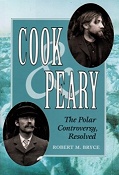 The
result is Cook
& Peary, the Polar Controversy, Resolved,
a history of exploration at a time when there were still great blanks
upon the face of the globe and before mechanized technology ended the
era of the classic battle of one man against all nature; a dual
biography of two very different men whose common ambition entwined
their lives for all time, and one which peels away the myths that have
grown up around them, singly and collectively, and replaces them with
documented facts, which, in turn, unravel multiple conspiratorial
theories to reveal the truth about what has been called the greatest
scientific hoax of all time. Now, at last, the answers can be had to
questions that have been debated endlessly for more than nine decades.
More than that, it is a search for truth, not only about this one
seemingly unimportant historical incident, but a search for the nature
of truth itself, embodied in a true story that is for once, really
stranger than fiction—so much stranger that had it not actually
happened it would seem entirely unbelievable. The
result is Cook
& Peary, the Polar Controversy, Resolved,
a history of exploration at a time when there were still great blanks
upon the face of the globe and before mechanized technology ended the
era of the classic battle of one man against all nature; a dual
biography of two very different men whose common ambition entwined
their lives for all time, and one which peels away the myths that have
grown up around them, singly and collectively, and replaces them with
documented facts, which, in turn, unravel multiple conspiratorial
theories to reveal the truth about what has been called the greatest
scientific hoax of all time. Now, at last, the answers can be had to
questions that have been debated endlessly for more than nine decades.
More than that, it is a search for truth, not only about this one
seemingly unimportant historical incident, but a search for the nature
of truth itself, embodied in a true story that is for once, really
stranger than fiction—so much stranger that had it not actually
happened it would seem entirely unbelievable.
Who discovered the North Pole? Read Cook & Peary, then decide for yourself. |


